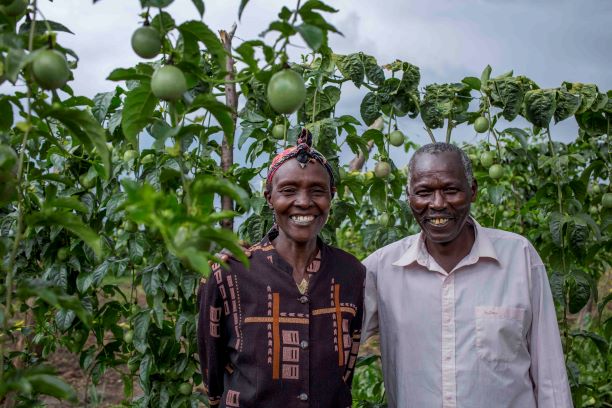Farming on the front line of climate change
How a Swedish philanthropist’s vision is working with Kenya’s small-scale producers to help them cope
7 minutes to read
Climate change is affecting farmers across the globe, but those in developing nations who produce 80% of the world’s food, are being hit the hardest. To coincide with Knight Frank’s coverage of the COP26 event, Andrew Shirley talks to Jack Ord, Programme Manager at Hand in Hand, which was founded by the Swedish philanthropist Percy Barnevik, to find out how the charity is working with Kenya’s small-scale producers to enable them to cope.

Jack Ord (pictured)
I interviewed Percy Barnevik for The Wealth Report in 2017 and was lucky enough to visit some of your projects in Kenya in 2018. Have the impacts of climate change become more apparent since then and what are the biggest issues farmers there are having to overcome?
You can see the growing impacts of climate change in the last two years let alone the past four or five. Last year at the onset of the pandemic, some of the farmers we work with were dealing with worst desert locust swarm in 70 years. Conditions for those swarms are a direct result of climate change and changing weather patterns. At the same time in western Kenya farmers were dealing with incredibly severe flooding. And now our farmers in central Kenya are dealing with severe drought - it hasn’t rained at all in nine months. Across the country we have seen revenues in every agricultural sector drop. These are the direct impacts of climate change and are being felt by farmers right now. Underpinning these issues is that 50% of Kenya’s arable soil is degraded - the ground is running out of nutrients. It’s not a problem unique to Kenya, but it does exacerbate the impacts of climate change farmers are feeling.
What agronomic techniques are you using to help farmers to overcome them?
For Hand in Hand these issues highlight the need for solutions that are both resilient to climate change and profitable, but importantly support regeneration of soil and regeneration of natural landscapes. We are essentially supporting a return to traditional Kenyan methods of farming: steering well clear of intensive monocultures; steering clear of the use of chemical fertilisers and pesticides; focusing on crop rotation, which is really effective on reducing the reliance on one type of soil nutrient and is great at discouraging weeds and pests; and building on that we are promoting intercropping.
"Circularity, or circular economy practices, are also key to overcoming climate change challenges and importantly driving down on-farm costs."
Can you explain a bit more about intercropping and this idea of circularity?
It’s simply growing several things on the same field at the same time that mutually reinforce one and other. Having a mixed field of different crops increases the availability of nutrients in the soil and crucially provides a diversification of income. For example, Esther, one of the entrepreneurs we work with in Nanyuki in central Kenya, grows cash crops like coffee, but she also plants onion and lemon grass around these more profitable crops because it keeps pests away as they don’t like the smell. That’s a solution that she has found and driven. In terms of circularity, our farming partners are creating organic manure from animal waste; creating their own animal feeds, which are really expensive, from unsold parts of crops, and all of this together increases resilience to climate change and to financial shocks like Covid. This drives down core costs and allows them to invest more on to their farms, reducing the risk of trialling new climate resilient and regenerative farming methods and fundamentally boosts incomes.
How are you persuading farmers to adopt these new practices? From my experience farmers can sometimes be resistant to change, even, dare I say it, a bit stubborn?
The farmers we work with aren’t stubborn. Like any business person if you present them with a business case that works they are going to run with it. And it’s important to say that Hand in Hand isn’t persuading anyone, all of these changes are Kenyan farmer-led solutions – farmers are persuading one and other. Hand in Hand acts as facilitators and encourages farmers to look at the examples of what their peers are doing well and what is working. We then support them to take these practices back to their own farms and try them out. With examples of successful business cases, we know they will spread far beyond the reach of Hand in Hand.
So these solutions are win-win-win – farmers are making more money, improving their soils and benefitting the environment?
Absolutely. It’s a triple win. We want to help farmers get loud about what is working for them, get loud about the impacts they’ve seen and the direction they want to see NGO and government support take with regards to regenerative farming and climate change mitigation.

Richard and Jane Langat who with the help of Hand in Hand have diversified into growing passion fruit
Is there a specific example of a project you are particularly proud of?
I think in the current context of climate change being felt so acutely it’s never about one project, it’s about seeing the combined success of farmers in one project being scaled across all of the regions we work in. When you see the achievement of one farmer and then take a step back and see that these achievements are being replicated across thousands of people’s lives with amazing benefits for their families and businesses and ecosystems, that’s where Hand in Hand takes pride. Just last week I was able to visit a farmer in central Kenya called Rebecca who started off with a small potato farm and a few chickens. After working with us and getting some business training she saw a business opportunity, developed a plan, secured herself a loan, bought herself 400 chickens and now has a thriving poultry business. She has reinvested the profits to expand what she calls her integrated farm where she grows a variety of crops in the same fields, harvests her own water for irrigation, keeps varying different types of livestock, trials different types of crops with little risk to her own business, uses all the waste from her livestock on the farm, but also has a surplus of organic manure she can sell to other farmers. Fundamentally, she now makes a lot of money. We want to give Rebecca the platform to show off her success so it can be replicated by other farmers.
Given the scale of the problems caused by climate change and the slow progress being made to tackle it, is it possible to really make a difference for the millions of farmers in Africa who are being affected?
Yes. Big change starts small, but must, must, must be farmer led. That’s what we are seeking to prove and to create a business case for. I’ve mentioned a few examples of farmers, but across the country there are thousands, millions of examples of them. Our colleagues in Kenya are about to engage in a big piece of advocacy wok that’s brand new for us. They are going to create platforms for farmers to take the spaces that NGOs and other civil society sectors usually dominate. The farmers we work with in Kenya already have voices, but we are going to make sure those voices are listened to at local, regional and international levels so farmers can drive the changes that farmers want to see in relationship to climate change mitigation, regenerative farming and circular economy practices.
Is it a mistake that the COP26 discussions don’t have a specific focus on agriculture?
There are many, many causes and impacts of climate change and COP26 already has a packed agenda. But at Hand in Hand we believe there is a fundamental need to rethink food systems both in terms of the contribution food production has to climate change and the effects of climate change on the majority of people who grow food – it’s no secret that those who suffer the impacts of climate change the most are those who contribute the least to it, and by not giving them a specific focus in forums like this there is a concern that the challenges they face will be exacerbated. We need to make sure as a civil society in forums like COP26 that farmers are actually being listened to and organisations are making the space for farmers to drive the change they want to see with regard to food systems. The question for Hand in Hand and similar organisations is to what extent we can act as an amplifier.
Find out more about Hand in Hand and the farmers in Kenya it is helping